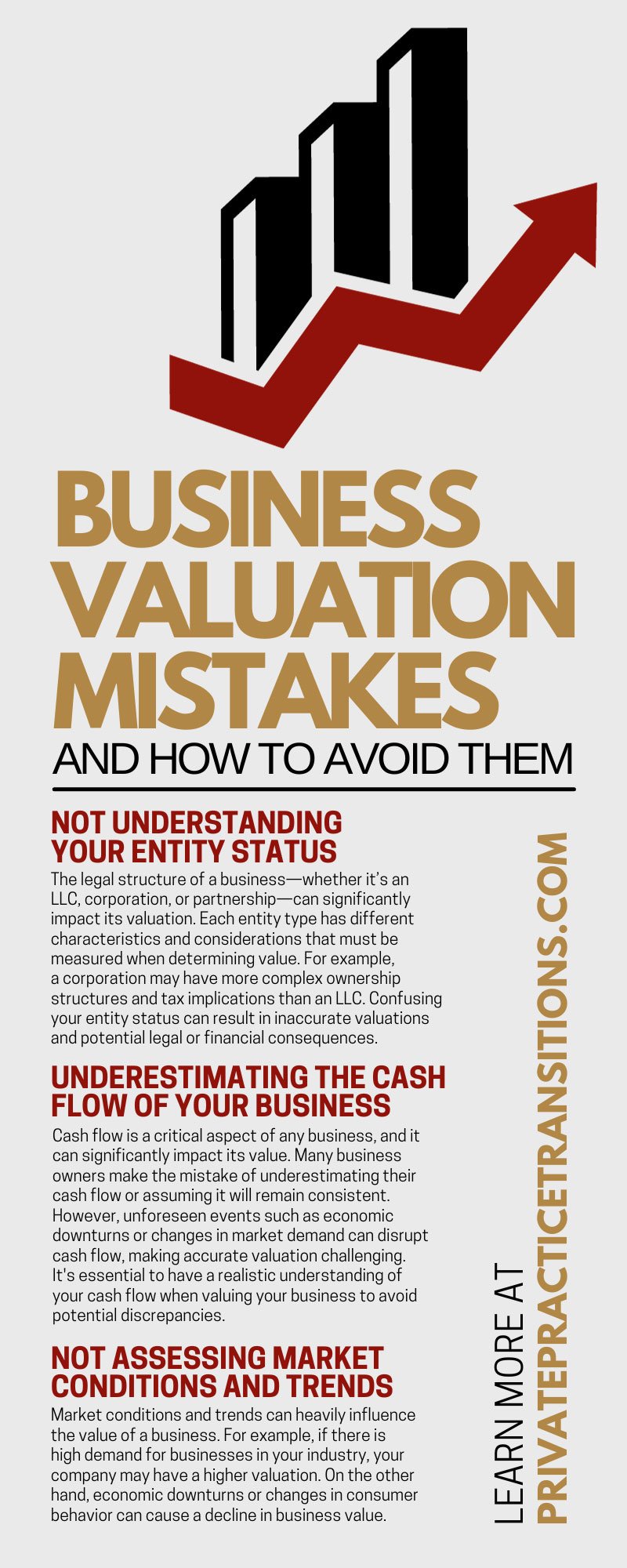Every business owner understands the importance of accurately valuing their business, especially when looking to sell or merge. However, navigating the complicated business valuation process can be challenging, with various potential pitfalls. Below, we'll explore common business valuation mistakes and offer guidance on how to avoid them for business owners.
The Importance of Business Valuation
Business valuation is a crucial aspect of any business, as it determines the worth and potential growth of the company. Accurately valuing a business can provide critical insights for decision-making and strategic planning. Whether you're looking to sell your business, attract investors, or merge with another company, knowing the true value of your enterprise is essential. However, without proper knowledge and guidance, business owners can fall into common valuation pitfalls that can significantly impact the outcome of any transaction.
The Different Types of Business Valuation
There are multiple business valuation approaches, each with advantages and limitations. The most used methods include the asset-based, market, and income approaches. Depending on the nature and characteristics of a particular business, owners may use one or more methods to determine an accurate valuation. Business owners must understand the different valuation methods and choose the one that best suits their business model.
The Difference Between Valuation and Appraisal
Valuation and appraisal are terms that are often used interchangeably, but they have subtle differences. Business valuation is the process of determining the true worth of a company after considering its financial and non-financial aspects, such as assets, liabilities, market trends, growth potential, and more. An appraisal is a formal document or report outlining a business's value, typically conducted by a professional appraiser.
Common Business Valuation Errors
There are many mistakes that business owners can make when valuing their company. By understanding and avoiding these errors, you can increase the accuracy of your valuation and protect your interests.
Not Understanding Tax Implications of Your Entity Status
The legal structure of a business—whether it’s an LLC, corporation, or partnership—can significantly impact taxes upon a transfer. Each entity type has different characteristics and considerations that must be measured when determining deal structure, and the ultimate value you will get for the sale of your business (after taxes). For example, a corporation may have more complex ownership structures and tax implications than an LLC. Not understanding the tax implications of your entity status can result in inaccurate valuations and potential legal or financial consequences.
Underestimating the Cash Flow of Your Business
Cash flow is a critical aspect of any business, and it can significantly impact its value. Many business owners make the mistake of underestimating their cash flow or assuming it will remain consistent. However, unforeseen events such as economic downturns or changes in market demand can disrupt cash flow, making accurate valuation challenging. It's essential to have a realistic understanding of your cash flow when valuing your business to avoid potential discrepancies.
Not Properly Documenting Your Assets and Liabilities
Proper documentation of assets and liabilities is critical for accurate business valuation. Assets can include tangible items, like equipment, inventory, and property, and intangible assets, like patents and trademarks. Liabilities encompass any debts or obligations that the business owes.
Overlooking Non-Cash Assets (Goodwill, Intellectual Property, etc.)
In addition to tangible assets, businesses can possess non-cash assets that contribute to their overall value. Goodwill, which refers to the value of a company's brand and reputation, can significantly impact its worth. In fact, most professional service companies trade almost exclusively on Goodwill value. Similarly, intellectual property such as patents, trademarks, and copyrights can add value to a business.
Not Assessing Market Conditions and Trends
Market conditions and trends can heavily influence the value of a business. For example, if there is high demand for businesses in your industry, your company may have a higher valuation. On the other hand, economic downturns or changes in consumer behavior can cause a decline in business value.
Relying Too Heavily on Market Comparisons
One of the most common valuation methods is the market approach, which involves comparing your business to similar companies recently sold. While this can be useful, relying too heavily on market comparisons can lead to inaccurate valuations. Each business is unique, and factors such as company culture, customer loyalty, and growth potential may not be reflected in market data.
Underestimating the Impact of Leverage
Leverage, or debt financing, refers to using borrowed funds to finance a business. While leverage can be beneficial for growth and expansion, it can also have a significant impact on business valuation. Too much debt can decrease the value of a business by increasing financial risk and decreasing its cash flow.
Not Considering Geographic Factors
Geographic factors can play a significant role in business valuation. For example, the location of a business can influence its market size, competition, and cost of doing business. Businesses in highly desirable areas may have higher valuations due to their potential for growth and profitability. Businesses situated in less favorable locations have lower valuations.
Overlooking Tax Implications
It's essential to consider potential tax consequences and plan accordingly when selling or merging a company. For example, a business with high taxable income may have a higher valuation due to its potential for future profits. If significant tax liabilities are transferred to the new owner, it can decrease the value of the business. It's important to consult a tax professional when valuing your business to ensure all potential tax implications are considered.
Not Hiring a Professional Appraisal
While business owners may attempt to value their company independently, hiring a professional appraiser can provide valuable expertise and insights. A professional appraiser is trained to assess the various factors contributing to business valuation, such as financial statements, market trends, industry-specific considerations, and more. They can also provide an unbiased evaluation of your business, which can be crucial in negotiations. While it may be an additional cost, hiring a professional appraiser can save you money by ensuring an accurate valuation and protecting your interests in any transaction.
Have Your Business Professionally Evaluated With Private Practice Transitions
Accurately valuing your business is crucial for any transaction or strategic planning. Understanding the different business valuation methods and common mistakes can ensure you avoid them and get a more precise evaluation of your company. However, to truly guarantee an accurate and unbiased assessment of your business's worth, hiring a professional valuation service like Private Practice Transitions is essential. With our expertise and experience in business valuation services, we can provide you with a comprehensive evaluation that considers all aspects of your business to help you make informed decisions for the future. Contact us today to learn more about our services and how we can help you with your business valuation needs.







